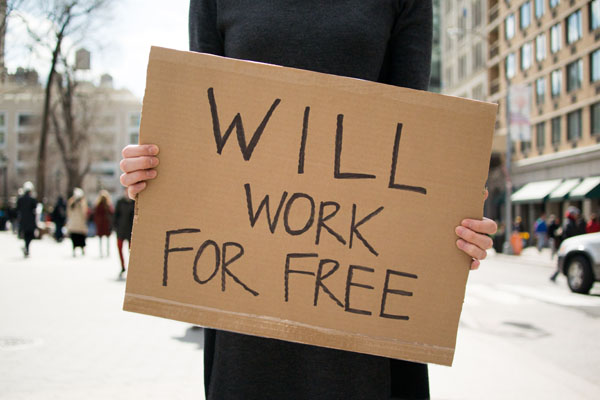
I was listening to James Altucher and Daymond John chat about business on James’s podcast today.
Daymond talked about the time when he was just getting started, before his mega hit company FUBU took off, when he was willing to give his knit hats away for free.
“You always have to ask yourself,” he told James. “What are you willing to do for free?”
Over the weekend, my friend Doug emailed me some free resources about how to advance our careers.
Doug has been in sales most of his life. He understands the importance of passing on valuable information for no other reason than wanting to be of service to people in his network.
In other words, he is willing to do for free nice things that can help others because he would do those things anyway. Why not spread the love?
One article on the list of resources he sent caught my eye. “10 Useless Buzzwords You Shouldn’t Use on a Resume in 2017.” The word leadership made the list. So did expert and excellent.
Here are the other 7:
strategic
creative
passionate
experienced
focused
certified
specialized
Apparently, these overused words are red flags to hiring managers and can instantly send a resume to the garbage can.
As I looked at this list, I cringed. Yikes. I’ve used some of these words in describing myself over the last few years. Almost everyone I know has, too.
On business cards. On LinkedIn profiles.
This got me thinking about how these buzzwords are overused in the entrepreneurial space, too. After all, it’s so easy these days to put up a website and claim yourself an “expert” in something like social media or internet marketing and have people contact you about your “services.”
Too Many Experts, Not Enough Accomplishments
I remember when social media was just gearing up in 2009, 2010. Almost overnight, an avalanche of “social media experts” hit the scene, killing a few and burying many alive.
It seemed like everywhere you turned, someone was suddenly an expert in how to use Twitter, Facebook and LinkedIn to make people rich (while they themselves were barely squeaking by — until they figured out they could charge exorbitant rates to teach unsuspecting folks about tools no one really understood yet but were sexy and seemed like the right things to learn).
One guy I ran into at a local networking event complained loudly that no one could possibly be an expert in social media as it wasn’t even a real “thing” yet. The jury was still out.
“Besides,” he said. “Social media is the kind of thing you should be willing to do for free!”
He was right, of course.
But he was also wrong.
With Change Comes a Lot of People Wondering What Just Happened
Like with any big change in history, the dust blinds most people in the beginning. That’s when the people who invented goggles that can see through the dust move in and make off with all the loot. While the majority is trying to make sense of what just happened, a minority is quickly becoming stinking rich.
Eventually the dust settles and the view is clear. The initial rush slows, even stops completely.
Consider the following passage about the California Gold Rush of 1849:
[su_quote cite=”History Channel”]Mining had always been difficult and dangerous labor, and striking it rich required good luck as much as skill and hard work. Moreover, the average daily take for an independent miner working with his pick and shovel had by then sharply decreased from what it had been in 1848. As gold became more and more difficult to reach, the growing industrialization of mining drove more and more miners from independence into wage labor. [/su_quote]
I’m not saying the rush to adopt social media is bad, or that it can’t lead to prosperity.
Social media has democratized communication and commerce in incredible ways, and made a lot of people incredibly rich. It provides unprecedented access to tools that can allow people to earn their livings, legally and justly.
But social media, like any new thing, must come with a warning. And the warning could read something like this:
If digging for gold in abandoned mines is something you enjoy doing and would be willing to do for free, then by all means. Keep digging.
In other words, walk through life with both eyes open. Do what you love doing, regardless of what others think or how much it pays. Don’t focus on the pay off. Focus on the doing. The tools and the right people you need to help you get what you want to get done will show up.
That’s what eventually happened to Daymond John. The tools and the people and the money he needed showed up.
Today he’s worth an estimated $300M and is truly free.
Oh the Noise, Noise, Noise, NOISE!
The Grinch is known for making that statement in a burst of frustration about the Whos down in Whoville going about their day, joyfully and without complaint.
And it’s true. The noise can get to us at times. Especially because it’s harder and harder to get noticed in a crowded world.
But shouting and complaining about it won’t change things. Neither will cutting out a Santa suit from a curtain and trying to be someone we’re not.
Instead…
Gotta ask the questions.
What am I willing to do for free?
How do I spend my time when I’m not earning a living?
What have I accomplished when I did something for free?
Answering these questions can give us (and those we would like to hire us) far more insight into what kind of experience they will have with us than listing a string of current jargon on a sheet of paper or a website page, hoping to look impressive.
In the end, what we’re willing to do for free can be the linchpin for getting hired somewhere, as an employee, as a freelancer, as a project worth investing in.
It can be the one thing that speaks louder than any experienced, passionate, strategic, focused, creative expert ever could, allowing us to show up fully as ourselves and then seeing where that true freedom can take us.

Very good.